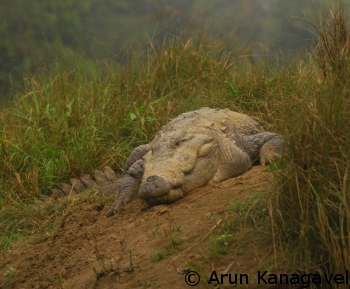
The participants were split into three groups and, over the course of the weekend, each group surveyed a section of the river, one group using a wooden canoe and the other using the NTNC’s dingy. Each group was on the river for about 5 hours and in that times they recorded sightings of gharials and muggers as well as making habitat assessments and noting human disturbance.
One group alone managed to spot an impressive eleven gharials. Unfortunately everyone saw a lot of evidence of human disturbance. We even started doing some proactive conservation work during the surveys! One of the participants works for Chitwan National Park so he has the authority to enforce conservation legislation in the park, in this instance that meant confiscating fishing nets that were being illegally used.

The other projects are: using (elephant!) line transects to assess tiger prey species; camera trapping for tigers, rhinos and other interesting species; using Sherman traps to do mark-recapture analysis of small mammals and comparing survey techniques for reptiles and amphibians. As part of the write up process, the participants will be writing blogs about their projects and we’ll post those here.
This week we’re being joined by Isabelle, a film maker from Germany. In addition to filming some of the course activities, Isabelle will be on hand to offer the course participants some advice on filming their projects and working with the media.Most of the participants are focusing on really poorly known EDGE species so it’s vital that they are given the tools to be an effective champion for their EDGE species.
Later in the week we’ll also be joined by Becky Day (Manager of Engagement and Interpretation at ZSL London Zoo) who’s visiting Nepal to contribute to ZSL’s vulture conservation work. During her whistle-stop visit, Becky will be sharing her skills and giving a crash course in some of the social elements of conservation work.
There’s lots to pack in but the participants are ready and raring to go!
